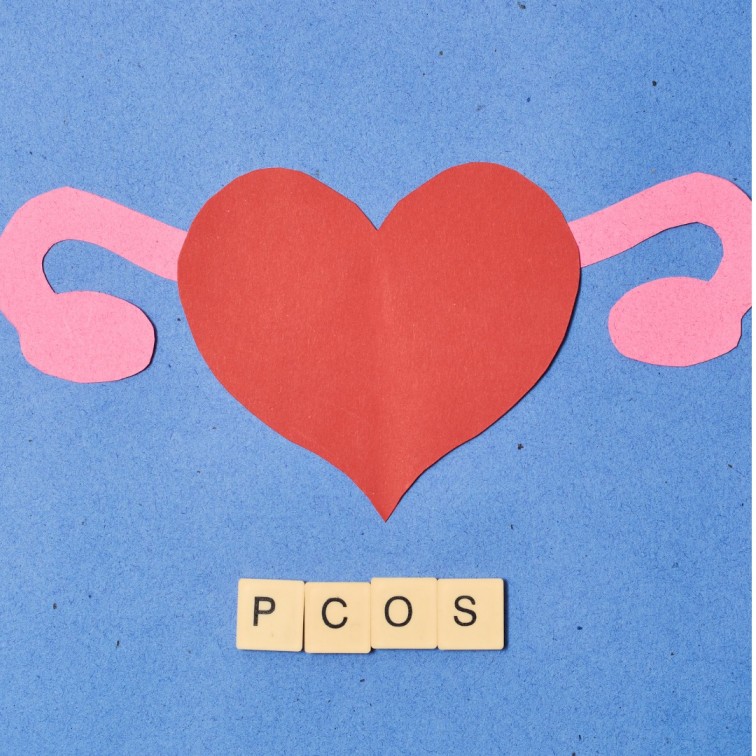පොලිසිස්ටික් ඔවේරියන් සින්ඩ්රෝම් (Polycystic Ovarian Syndrome) පිළිබඳව තේරුම් ගැනීම

පීකොස් (PCOS) යනු ප්රජනක වයසේ සිටින කාන්තාවන් 10 දෙනෙකුගෙන් 1 අයෙකුට බලපාන පොදු හෝමෝන අසමතුලිතතාවයකි. මෙම තත්වය තරුණ කාන්තාවන් අතර වඩාත් සුලබ තත්වයක් බවට පත්වෙමින් පවතින අතර වඳභාවය, තරබාරුකම සහ දියවැඩියාව වැනි සෞඛ්ය ගැටළු ඇතිකළ හැකිය. මෙම තත්වය සඳහා නිශ්චිත හේතුවක් හඳුනාගෙන නොමැති නමුත් හෝමෝන අසමතුලිතතාවය, ඉන්සියුලින් තත්වයන්ගේ වෙනස්කම් සහ ජානමය සාධක කාරණාවල එකතුවක් මේ සඳහා හේතු වියහැකිය.
මෙම තත්වය (PCOS) සහිත කාන්තාවන් හඳුනාගතහැකි රෝග රෝග ලක්ෂණ 3කි. එනම්,
අක්රමවත් ඔසප්වීම හෝ ඔසප් නොවීම.
ඉහළ ටෙස්ටෙස්ටේරෝන් හෝමෝන තත්වයන් නිසා කුරුලෑ ඇතිවම, පිරිමින්ගේ ආකාරයට කෙස් වර්ධනය වීම ආදී රෝග ලක්ෂණ ඇතිවීම.
අල්ට්රා සවුන්ඩ් ස්කෑන් කිරීමකදී ඩිම්බකෝෂවල වතුර බිබිලි වැනි බොහෝ ෆොසිලල් සහිත ඩිම්බ කෝෂ පවතිනබව නිරීක්ෂණය වීම.
PCOS තත්වය හඳුනා ගැනීම සඳහා ඉහත රෝග ලක්ෂණ 3න් 2ක් පමණක් අවශ්යවන අතර තවත් බොහෝ රෝග ලක්ෂණ පැවතිය හැකිය. එනම්, තෙහෙට්ටුව, නින්ද නොයාම, කාංසාව, මානසික අවපීඩනය, හිසකෙස් සිහින් වීම හෝ හිසකෙස් යාම, බර අඩු කර ගැනීමේ අපහසුතාව සහ හිසරදය ආදී ප්රතිකාර තත්වයන් වේ.
PCOS තත්වය සඳහා නිශ්චිත ප්රතිකාරයක් නැති නමුත් විකල්ප ප්රතිකාර ගණනාවක් තිබේ. එබැවින් ඉහත රෝග ලක්ෂණ එකකින් හෝ කිහිපයකින් ඔබ පීඩා විඳින්නේ නම් සෞඛ්ය සේවා වෘත්තිකයෙකු සමඟ මේ පිළිබඳව සාකච්ඡා කිරීම වැදගත්වේ. ඒ හරහා මෙම රෝග තත්වය කළමනාකරණය කරගැනීම සඳහා සංයුක්ත කළමනාකරණ සැලැස්මක් ආරම්භ කළ හැකිය.
විකල්ප ප්රතිකාර
ජීවන රටාව පදනම් කරගත් ප්රතිකාරතිකාර ක්රම
ජීවන රටාව වෙනස් කිරීම PCOS තත්වය කළමනාකරණයේ මූලික පියවර වශයෙන් සැලකිය හැකිය. එබැවින්, ඉහළ ප්රෝටීන් ප්රමාණයක් සහිතව සමබර ආහාර වේලක් ලබාගැනීම, තන්තුමය අහාර පරිභෝජනය වැඩි කිරීම සහ පිරිපහදු කළ සීනි හෝ සැකසූ ආහාර අඩුවෙන් ගැනීමට හුරුවීම මම රෝග ලක්ෂණ අවම කරගැනීමට හේතුවේ. තවද, සතියකට දින පහක් අවම වශයෙන් මිනිත්තු මධ්යස්ථ වේගයක් පවත්වාගනිමින් දිනපතා ව්යායාම කිරීමප්රයෝජනවත් වන අතර ශරීරයේ බර අඩුකර ගැනීමෙන් ඔසප් චක්රය විධිමත් කිරීමට සහ ඉන්සියුලින් තත්වයේ වෙනස්කම් අවම කිරීමට හේතු වේ.
මානසික වෛද්යවරයෙක් හෝ සෞඛ්ය වෘත්තිකයෙකු හරහා PCOS තත්වය වටා ගොඩනැංවි ඇති මානසික රෝගී තත්වයන් සහ ආතතිය සඳහා මනෝවිද්යාත්මක සහාය ලබාදිය හැකිය.
ප්රමාණවත් නින්දක් ලබාගැනීම තුළින් ආතතිය අවම කරගත හැකි අතර PCOS රෝග ලක්ෂණ වඩාත් තීව්රවීම අවම කරයි.
වෛද්යමය ප්රතිකාර ක්රම
ඔබ ගැබ් ගැනීමක් පිළිබඳව සැලසුම් නොකරයි නම් හෝමෝනමය උපත්පාලන ක්රමවේදයක් භාවිතා කිරීම (ගිලින පෙති හෝ වෙනත්) හරහා ඔසප් චක්රය ක්රමවත් කරගැනීමට, ටෙස්ටොස්ටෙරෝන් මට්ටම අඩු කිරීමට හා සැලසුම් නොකළ ගැබ් ගැනීම් වළක්වා ගැනීමට උපකාර වේ.
ඔබ ගැබ් ගැනීමකට සැලසුම් කරන්නේ නම්, දියවැඩියා ඖෂධ මෙට්ෆෝමින් ඔබේ ශරීරය ඉන්සියුලින් භාවිතා කරන ආකාරය වැඩිදියුණු කිරීමට සහ ඔසප් චක්රය නියාමනය කිරීමට උපකාරී වන අතර එමඟින් ඔබේ පිළිසිඳ ගැනීමේ අවස්ථා වැඩි කළ හැකිය.
සාරවත් බව වැඩි දියුණු කිරීම සඳහා ක්ලෝමිෆෙන් (clomiphene), සයිට්රේට් (citrate), ලෙට්රොසෝල් (letrozole) වැනි වෙනත් ඖෂධ වර්ග ලබාදීම.
අමතර හිසකෙස් වැවීම, කුරුලෑ තත්වයන් අවම කරගැනීම සඳහා ස්ප්යිරෝනොලැක්ටන් (spironolactone) වැනි ඖෂධ භාවිතා කළ හැකිය.
ප්රතිකාර ක්රම
සාරවත් බව වැඩි දියුණු කිරීම සඳහා, ලැපරොස්කොපි, ඩිම්බකෝෂ සිදුරු කිරීම සහ අභ්යන්තර සංසේචනය (IVF) වැනි ශල්ය ප්රතිකාර සිදු කළ හැකිය.
නව විකල්ප ප්රතිකාර ක්රම
PCOS රෝග ලක්ෂණ සඳහා විකල්ප ප්රතිකාර වශයෙන් ඉනොසිටෝල් (inositol) සහ බර්බෙරින් (berberine) වැනි පෝෂණ අතිරේක ඉස්මතු වෙමින් පවතියි. කෙසේ නමුත් PCOS තත්වය කළමනාකරණය කිරීමේදී පෝෂණ අතිරේකවල ඵලදායිබව සහ ආරක්ෂිත පැතිකඩ පිළිබඳව අවබෝධ කරගැනීම සඳහා තවත් පර්යේෂණ, අධ්යයනයන් සිදු කළ යුතුය.
PCOS සංකීර්ණ තත්වයක් වන අතර එහි රෝග ලක්ෂණ ඵලදායී ලෙස කළමනාකරණය කිරීම සඳහා විවිධ විකල්ප ප්රතිකාර ක්රම තිබේ. පවතින ජීවන රටා වෙනස් කිරීම, ඖෂධ සහ උසස් ප්රතිකාරවලට යොමුවීම මගින් PCOS සහිත කාන්තාවන්ගේ ජීවන තත්ත්වය සැලකිය යුතු මට්ටමකින් වැඩිදියුණු කළ හැක. කාන්තාවන්ට ඔවුන්ගේ නිශ්චිත අවශ්යතා සහ ඉලක්ක ආමන්ත්රණය කළහැකි ඒ ඒ පුද්ගලයාට ගැලපෙන පරිදි (පුද්ගලාරෝපිත) ප්රතිකාර සැලැස්මක් සකස් කිරීම සඳහා ඔවුන්ගේ සෞඛ්ය සේවා සපයන්නන් සමඟ සමීපව කටයුතු කිරීම අත්යවශ්ය වේ. තවද, නවතම ප්රතිකාර ක්රම පිළිබඳව දැනුවත්ව සිටීමෙන් සහ ජීවන රටාවේ සිදුකරන ක්රියාශීලි වෙනස්කම් හරහා PCOS ඇති කාන්තාවන්ට සෞඛ්ය සම්පන්න, වඩාත් තෘප්තිමත් ජීවිතයක් ගත කළ හැකිය.
.png)



